Unit 3 Life in the future Discovering useful structures 课件(共59张PPT)
文档属性
| 名称 | Unit 3 Life in the future Discovering useful structures 课件(共59张PPT) |  | |
| 格式 | zip | ||
| 文件大小 | 1.2MB | ||
| 资源类型 | 教案 | ||
| 版本资源 | 人教版(新课程标准) | ||
| 科目 | 英语 | ||
| 更新时间 | 2019-11-17 15:03:43 | ||
图片预览

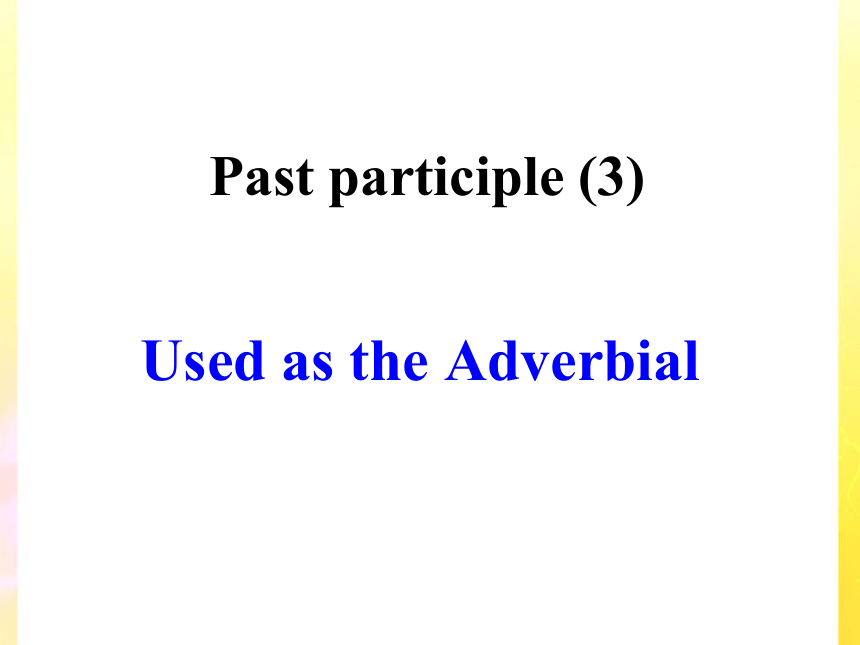
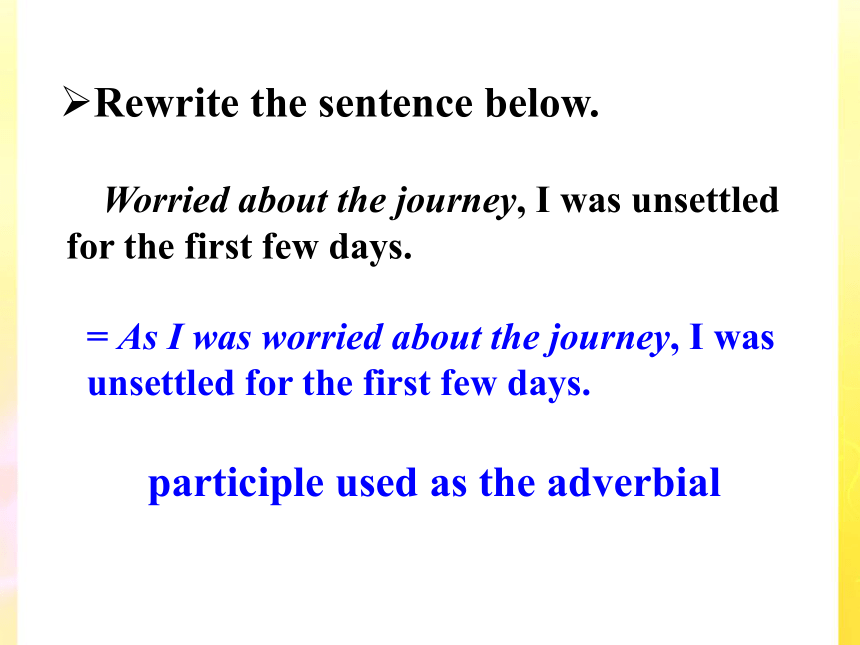
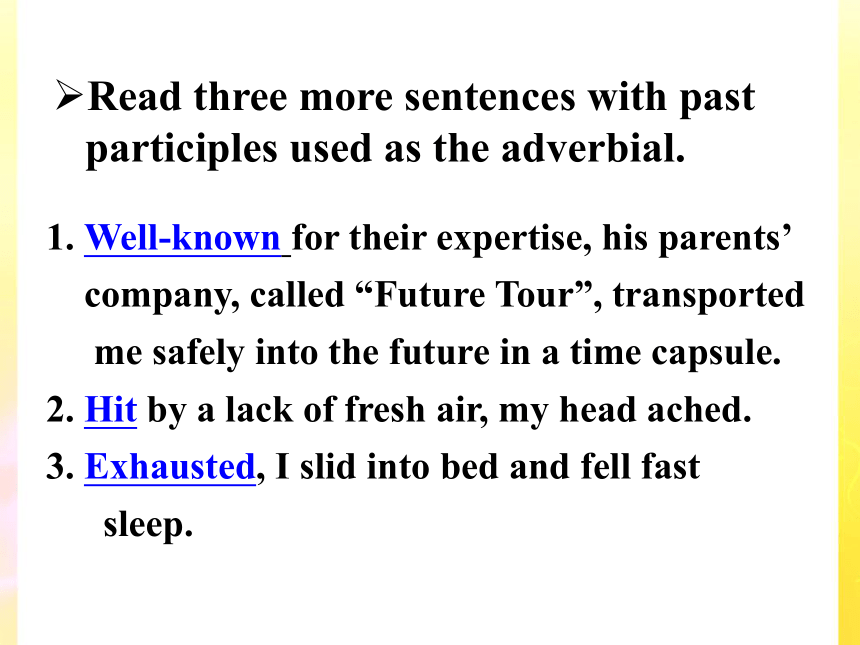
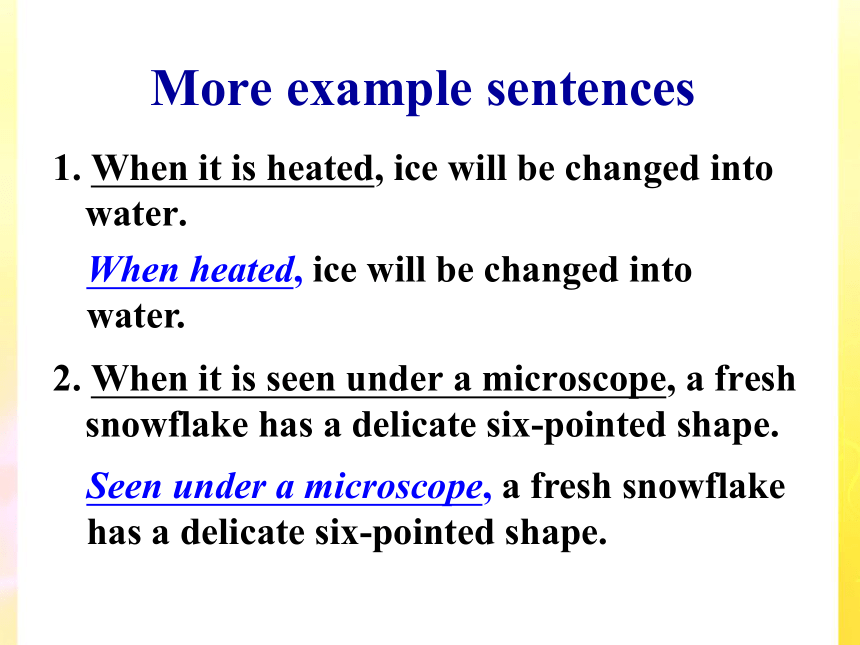
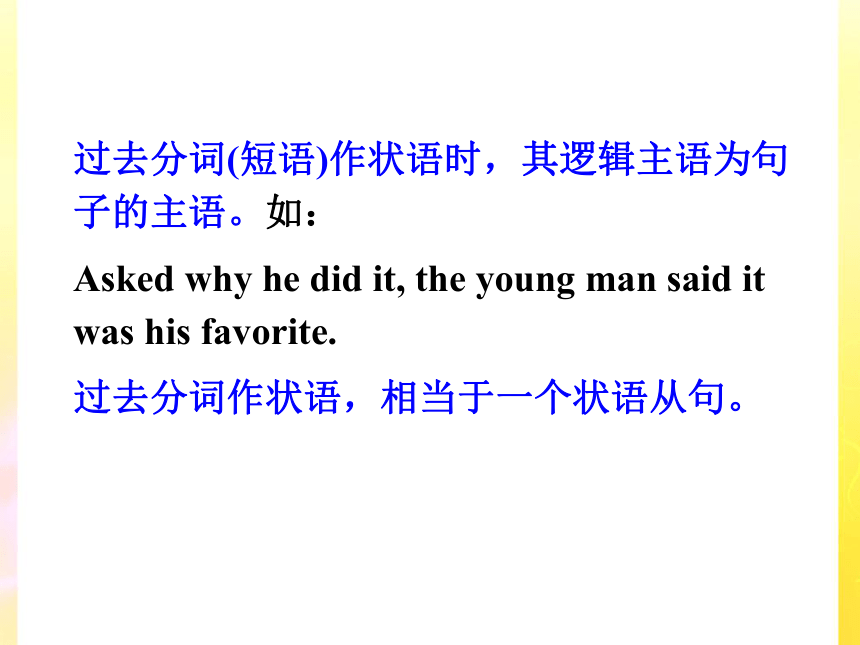
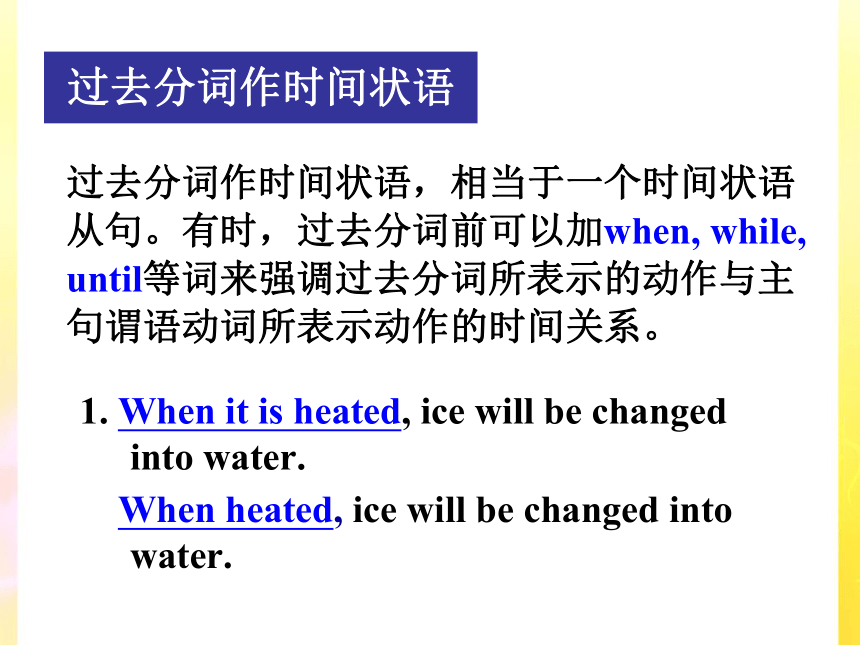
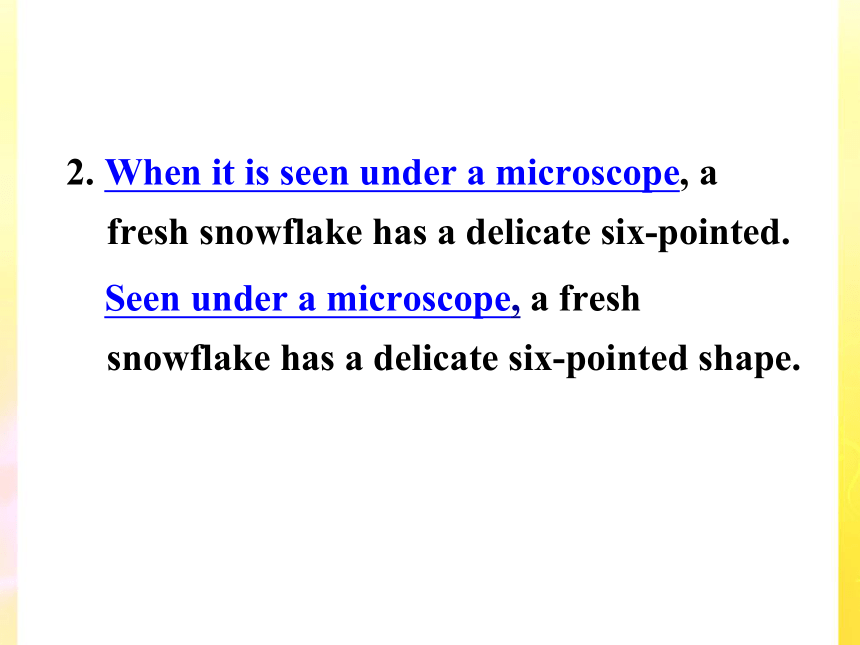
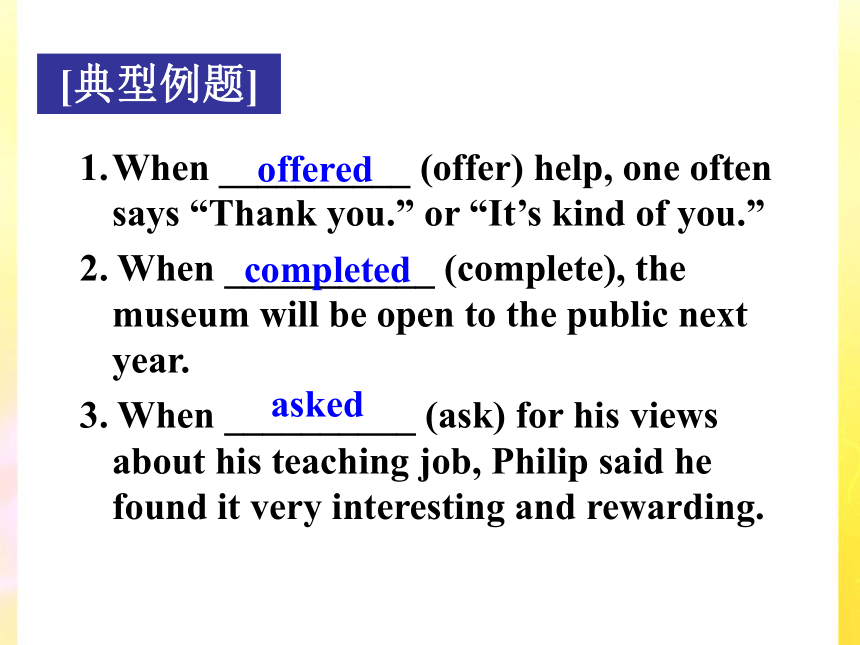
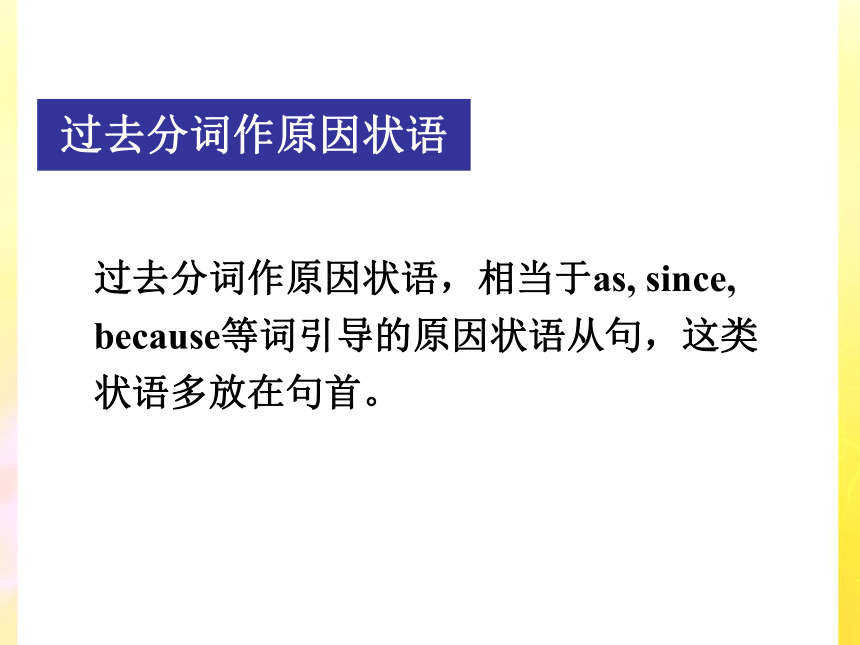
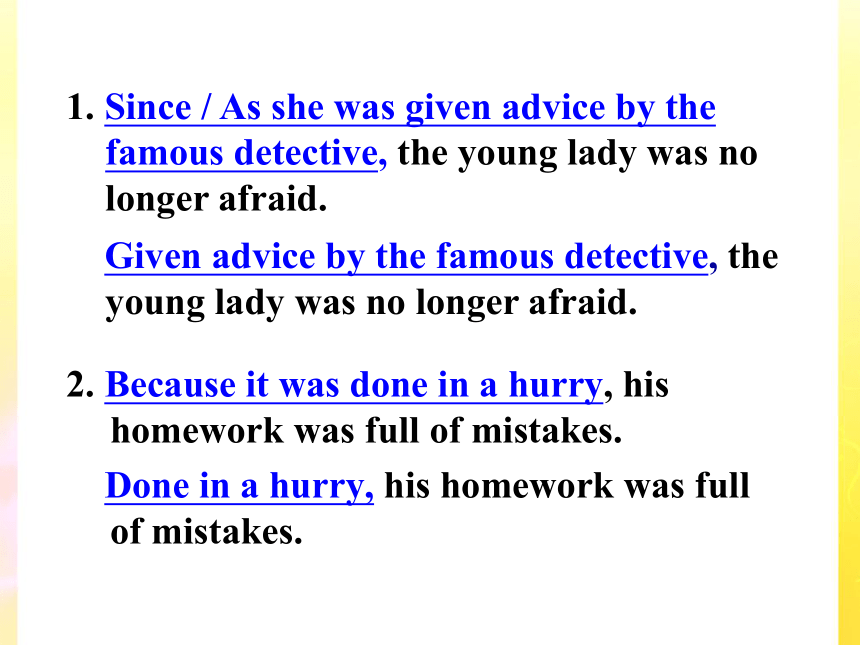

文档简介
(共59张PPT)
Past participle (3)
Used as the Adverbial
Worried about the journey, I was unsettled for the first few days.
= As I was worried about the journey, I was unsettled for the first few days.
Rewrite the sentence below.
participle used as the adverbial
Read three more sentences with past
participles used as the adverbial.
1. Well-known for their expertise, his parents’
company, called “Future Tour”, transported
me safely into the future in a time capsule.
2. Hit by a lack of fresh air, my head ached.
3. Exhausted, I slid into bed and fell fast
sleep.
More example sentences
1. When it is heated, ice will be changed into water.
2. When it is seen under a microscope, a fresh snowflake has a delicate six-pointed shape.
When heated, ice will be changed into water.
Seen under a microscope, a fresh snowflake has a delicate six-pointed shape.
过去分词(短语)作状语时,其逻辑主语为句子的主语。如:
Asked why he did it, the young man said it was his favorite.
过去分词作状语,相当于一个状语从句。
过去分词作时间状语
1. When it is heated, ice will be changed into water.
When heated, ice will be changed into water.
过去分词作时间状语,相当于一个时间状语从句。有时,过去分词前可以加when, while, until等词来强调过去分词所表示的动作与主句谓语动词所表示动作的时间关系。
2. When it is seen under a microscope, a fresh snowflake has a delicate six-pointed.
Seen under a microscope, a fresh snowflake has a delicate six-pointed shape.
When __________ (offer) help, one often says “Thank you.” or “It’s kind of you.”
2. When ___________ (complete), the museum will be open to the public next year.
3. When __________ (ask) for his views about his teaching job, Philip said he found it very interesting and rewarding.
[典型例题]
offered
completed
asked
过去分词作原因状语
过去分词作原因状语,相当于as, since, because等词引导的原因状语从句,这类状语多放在句首。
2. Because it was done in a hurry, his homework was full of mistakes.
Done in a hurry, his homework was full of mistakes.
1. Since / As she was given advice by the famous detective, the young lady was no longer afraid.
Given advice by the famous detective, the young lady was no longer afraid.
_______________ (encourage) by the advances in technology, many farmers have set up wind farms on their land.
【答案】 Encouraged 。“受到科技进步的激励,许多农民在他们的土地上建起了风力发电场。” 该句可转化为:As they are encouraged by the advances in technology, …。
[典型例题]
Encouraged
过去分词作条件或者假设状语
过去分词作条件状语,相当于if, unless等词引导的条件状语从句。
1. If they had been given more attention, the cabbages could have grown better.
Given more attention, the cabbages could have grown better.
2. If I am compared with you, we still have a long way to go.
Compared with you, we still have a long way to go.
_________ (give) the right kind of training, these teenage soccer players may one day grow into international stars.
【答案】 Given 。“如果得到正确的训练,这些少年足球选手们有朝一日可能成为国际明星。” 如果把句子补充完整: If they are given the right kind of training , 就不难看出主语these teenager soccer players与give之间是被动关系。
Given
[典型例题]
Unless _________ (invite) to speak, you should remain silent at the conference.
Time, _________ (use) correctly, is money in the bank.
__________ (use) with care, one tin will last for six weeks.
invited
used
Used
过去分词作方式或伴随情况状语
过去分词作方式状语或伴随状语时,相当于一个并列分句,没有相应的状语从句可替换。
2. She sat by the window, and she was lost in thought.
She sat by the window, lost in thought.
1. The hunter left his house, and he was followed by his dog.
The hunter left his house, followed by his dog.
Michael’s new house is like a huge palace, __________ (compare) with his old one.
【答案】 compared 。“和旧房子相比,迈克尔的新房子就像一座巨大的宫殿。”
[典型例题]
compared
Mr. Smith, _________ (tire) of the _________ (bore) speech, started to read a novel.
【答案】tired,boring。(be) tired of 的意思是“厌倦…”,过去分词短语在句中作原因状语,其逻辑主语是句子的主语Mr. Smith;现在分词boring的意思是“令人厌烦的”,修饰speech。
tired
boring
_________ (raise) in the poorest area of Glasgow, he had a long, hard road to becoming a football star.
_________ (absorb) in painting, John didn’t notice evening approaching.
Raised
Absorbed
过去分词作让步状语
过去分词作让步状语。过去分词与though / although / even if / even though / however等词连用,相当于一个让步状语从句。
Although we were exhausted by the climb, we continued our journey, we continued our journey.
Exhausted by the climb, we continued our journey.
No matter how frequently _________ (perform), the works of Beethoven still attract people all over the world.
【答案】 performed 。“不管多么频繁地被演奏,贝多芬的作品仍吸引着全世界的人们。”。句子还原即是No matter how frequently they are performed, …
[典型例题]
performed
1)过去分词在句子中可以作时间状语、原因状语、伴随状语、条件状语、让步状语等。
2)过去分词作状语时,过去分词的逻辑主语与句子主语一致。
Summary
过去分词作状语有两大特点:
1)表示被动的动作,分词与主语的逻辑关系被动;
2)表示已经完成的动作。
1. Asked what had happened, he told us about it.
→When he was asked what had happened, he told us about it.
2. Well-known for his expert advice, he received many invitations to give lectures.
→Because he was well known for his expert advice, he received many invitations to give lectures.
Rewrite the sentences with proper conjunctions.
3. Given more time, we would be able to do the work much better.
If we were given more time, we would be able to do the work much better.
4. Once translated into Chinese, the book became very popular among Chinese teenagers.
Once it was translated into Chinese, the book became very popular among Chinese teenagers.
5. Deeply interested in medicine, she decided to become a doctor.
Because she was deeply interested in medicine, she decided to become a doctor.
6. Left alone at home, Sam did not feel afraid at all.
Although he was left alone at home,Sam did not feel afraid at all.
Rewrite the sentences with past participle.
As I was worried about the journey,
I was unsettled for the first few days.
→ _______________________ , I was unsettled for the first few days.
Worried about the journey
2. If he is given time, he’ll make a first-class tennis player.
→ _________ , he’ll make a first-class tennis player.
3. As I was confused by the new surroundings, I was hit by the lack of fresh air.
→ ______________________________, I was hit by the lack of fresh air.
Given time
Confused by the new surroundings
4. When he was questioned by the police about the fire, he became tense.
→ ________________________________, he became tense.
Questioned by the police about the fire
1. Frightened by the loud noise, I went to see what was happening.
2. Hit by the lack of fresh air, he got a bad headache,
3. Tired after the long journey, I still enjoyed meeting the aliens on the space station
4. Frightened by the noise outside, the little girl dared not sleep in her bedroom.
Combine these sentences using the past participle as the adverbial. (Ex2, Page 21)
5. Built in 1910, the museum is almost 100 years old.
6. Given some advice by the famous scientist, the student was not worried about his scientific experiment any more.
7. Exhausted after a day’s work, George took some tablets to help him feel better.
8. Very astonished by the amount of work in the new timetable, Lucy decided to leave her job immediately.
1. Following the old man, we went upstairs.
(跟着那个老人,我们上了楼)
2. Followed by the old man, we went upstairs.
(被那个老人跟着,我们上了楼)
比较下面的每组两句话。
3. 从上面看,体育场好像一个鸟巢。
_______ from the top, the stadium looks like a bird nest.
4. 从太空看,宇航员看不到长城。
_______ from the space, the astronaut could not discover the Great Wall.
Seen
Seeing
注 意
作状语的过去分词其逻辑主语通常就是句子的主语,且主语是过去分词动作的承受者,即过去分词表示的动作不是句子的主语发出的;过去分词与主语之间是动宾关系,即被动关系。这一点是与现在分词作状语的情况是不同的,后者与主语之间是主谓关系。
Complete each sentence using the Past Participle of the right verb.
1) _________ by noises in the night, the girl no longer dared to sleep in her room.
2) The lady returned home, ________ by two policemen.
frighten trap follow shoot
Frightened
followed
3) If _______ in a burning building, you should send for help.
4) Although ____in the leg, he continued firing at the thief.
trapped
shot
Past participle (3) Used as the Attribute
过去分词作定语
过去分词作定语与其所修饰的词之间存在着逻辑上的被动关系,且表示该动作已经完成。单个的过去分词作定语,通常置于被修饰的词的前面;分词短语作定语时,须置于被修饰词的后面。
1. Last Sunday we went on an organized trip to the forest. 上周日我们进行了一次有组织的去森林的旅行。
2. A letter posted today will reach him the day after tomorrow. 今天寄出的信后天他就能收到。
被动意义
an honored guest
一位受尊敬的客人
(受伤的工人)are now being taken good care of in the hospital.
B. 完成意义
a retired teacher
一位退休教师
They are cleaning (落叶) in the yard.
The injured workers
the fallen leaves
过去分词作定语前置和后置
两种情况
单个的过去分词作定语, 通常放在被修饰的名词之前, 表示被动和完成意义。
1.前置定语
过去分词短语作定语时,通常放在被修饰的名词之后,它的作用相当于一个定语从句。
This will be the best novel of its kind ever written.
=
Who were the so-called guests invited
(= ) to your party last night?
that has ever been written
who had been invited
2. 后置定语
如果被修饰的词是由every / some /any /no + thing / body /one所构成的复合代词或指示代词those等时,即使一个单一的分词作形容词用,也要放在被修饰词的后面。例如:
Is there anything unsolved?
There is noting changed here since I left this town.
注意:
现在分词作定语,它与被修饰的名词存在着逻辑上的主谓关系,而且该动词的动作正在进行。
过去分词做定语时,它与被修饰的名词存在着逻辑上有动宾关系,而且该动词的动作已经发生了。
现在分词与过去分词作定语的区别
He worked as a worker building roads. (主动)
= He worked as a worker who / that built roads.
This is a picture painted by my father. (被动)
= This is a picture which was painted by my father.
I know the young man sleeping on the bench. (在进行)
= I know the young man who is sleeping on the bench.
The letter mailed last night will reach him tomorrow. (已完成)
= The letter which was mailed last night will reach him tomorrow.
过去分词短语有时亦可用作非限制性定语,前后常有逗号。
Some of them, born and brought up in country villages, had never seen a train.
分词作定语可以转换成定语从句:
We live in a house facing (which faces) the south.
This is the factory (which was) built in 1980.
1. Soon we lost sight of that famous astronomer called Li Qiang.
2. I am going to buy a painting copied from Vincent van Gogh.
3. I like that old private house built of wood and mud.
Combine these sentences using the past participle as the attribute. (Ex3, Page 21)
4. The room connected to the rest of the house by a long passage is completely empty.
5. The queen was sitting in a royal carriage drawn by four horses.
6. The vehicle mentioned in the book is unknown to me.
7. The castle built in 1432 is under repair.
The Olympic Games, first_________ (play) in 776 B. C., didn’t include women until 1912.
例题点拨
简析:首先,根据语法分析可知,待选部分是一个作定语、修饰 The Olympic Games的后置分词短语;再根据 The Olympic Games 对于动词 play 来说只能是被动承受,且已完成 (in 776 B. C.)。
played
2. What’s the language ________ (speak) in Germany?
简析: 测试过去分词作后置定语表达被动,等于定语从句 which is spoken。
3. Most of the artists ________ (invite) to the party were from South Africa.
简析: 测试过去分词作后置定语表达被动,等于定语从句who were invited。
spoken
invited
4. The computer centre, _________ (open) last year, is very popular among the students in this school.
简析: 测试过去分词短语作定语放在所修饰的名词后,可以用非限制性定语从句which was opened last year代替。
opened
5. The first textbooks _________ (write) for teaching English as a foreign language came out in the 16th century.
简析: 测试过去分词作后置定语表达被动,等于定语从句which were written。
written
When ________ (ask) if she would request a rise, the actress said that money was not important.
在空白处填入所给动词的正确形式。
2. Yesterday I saw in the newspaper a teaching post _________ (advertise) at a school close to my home and I wanted to apply for it.
asked
advertised
3. Mary’s father said that he would attend the meeting if ________ (invite).
4. John, __________ (frighten) by the terrible accident, could say nothing at first. ?
5. _________ (carry) in a small basket, the dog constantly moved from side to side.
invited
frightened
Carried
6. Greatly _________ (inspire) by the warm-hearted people around, they decided to make great efforts to try the experiment again. ????
7. __________ (surround) by a group of young people, the old man was very delighted.
inspired
Surrounded
7. _________ (fill with) unimaginable strength, the injured soldier struggled to his own feet. ???? 8. With his eyes ________ (fix) on the computer?screen, he didn’t notice his mother coming in. ?
Filled with
fixed
Past participle (3)
Used as the Adverbial
Worried about the journey, I was unsettled for the first few days.
= As I was worried about the journey, I was unsettled for the first few days.
Rewrite the sentence below.
participle used as the adverbial
Read three more sentences with past
participles used as the adverbial.
1. Well-known for their expertise, his parents’
company, called “Future Tour”, transported
me safely into the future in a time capsule.
2. Hit by a lack of fresh air, my head ached.
3. Exhausted, I slid into bed and fell fast
sleep.
More example sentences
1. When it is heated, ice will be changed into water.
2. When it is seen under a microscope, a fresh snowflake has a delicate six-pointed shape.
When heated, ice will be changed into water.
Seen under a microscope, a fresh snowflake has a delicate six-pointed shape.
过去分词(短语)作状语时,其逻辑主语为句子的主语。如:
Asked why he did it, the young man said it was his favorite.
过去分词作状语,相当于一个状语从句。
过去分词作时间状语
1. When it is heated, ice will be changed into water.
When heated, ice will be changed into water.
过去分词作时间状语,相当于一个时间状语从句。有时,过去分词前可以加when, while, until等词来强调过去分词所表示的动作与主句谓语动词所表示动作的时间关系。
2. When it is seen under a microscope, a fresh snowflake has a delicate six-pointed.
Seen under a microscope, a fresh snowflake has a delicate six-pointed shape.
When __________ (offer) help, one often says “Thank you.” or “It’s kind of you.”
2. When ___________ (complete), the museum will be open to the public next year.
3. When __________ (ask) for his views about his teaching job, Philip said he found it very interesting and rewarding.
[典型例题]
offered
completed
asked
过去分词作原因状语
过去分词作原因状语,相当于as, since, because等词引导的原因状语从句,这类状语多放在句首。
2. Because it was done in a hurry, his homework was full of mistakes.
Done in a hurry, his homework was full of mistakes.
1. Since / As she was given advice by the famous detective, the young lady was no longer afraid.
Given advice by the famous detective, the young lady was no longer afraid.
_______________ (encourage) by the advances in technology, many farmers have set up wind farms on their land.
【答案】 Encouraged 。“受到科技进步的激励,许多农民在他们的土地上建起了风力发电场。” 该句可转化为:As they are encouraged by the advances in technology, …。
[典型例题]
Encouraged
过去分词作条件或者假设状语
过去分词作条件状语,相当于if, unless等词引导的条件状语从句。
1. If they had been given more attention, the cabbages could have grown better.
Given more attention, the cabbages could have grown better.
2. If I am compared with you, we still have a long way to go.
Compared with you, we still have a long way to go.
_________ (give) the right kind of training, these teenage soccer players may one day grow into international stars.
【答案】 Given 。“如果得到正确的训练,这些少年足球选手们有朝一日可能成为国际明星。” 如果把句子补充完整: If they are given the right kind of training , 就不难看出主语these teenager soccer players与give之间是被动关系。
Given
[典型例题]
Unless _________ (invite) to speak, you should remain silent at the conference.
Time, _________ (use) correctly, is money in the bank.
__________ (use) with care, one tin will last for six weeks.
invited
used
Used
过去分词作方式或伴随情况状语
过去分词作方式状语或伴随状语时,相当于一个并列分句,没有相应的状语从句可替换。
2. She sat by the window, and she was lost in thought.
She sat by the window, lost in thought.
1. The hunter left his house, and he was followed by his dog.
The hunter left his house, followed by his dog.
Michael’s new house is like a huge palace, __________ (compare) with his old one.
【答案】 compared 。“和旧房子相比,迈克尔的新房子就像一座巨大的宫殿。”
[典型例题]
compared
Mr. Smith, _________ (tire) of the _________ (bore) speech, started to read a novel.
【答案】tired,boring。(be) tired of 的意思是“厌倦…”,过去分词短语在句中作原因状语,其逻辑主语是句子的主语Mr. Smith;现在分词boring的意思是“令人厌烦的”,修饰speech。
tired
boring
_________ (raise) in the poorest area of Glasgow, he had a long, hard road to becoming a football star.
_________ (absorb) in painting, John didn’t notice evening approaching.
Raised
Absorbed
过去分词作让步状语
过去分词作让步状语。过去分词与though / although / even if / even though / however等词连用,相当于一个让步状语从句。
Although we were exhausted by the climb, we continued our journey, we continued our journey.
Exhausted by the climb, we continued our journey.
No matter how frequently _________ (perform), the works of Beethoven still attract people all over the world.
【答案】 performed 。“不管多么频繁地被演奏,贝多芬的作品仍吸引着全世界的人们。”。句子还原即是No matter how frequently they are performed, …
[典型例题]
performed
1)过去分词在句子中可以作时间状语、原因状语、伴随状语、条件状语、让步状语等。
2)过去分词作状语时,过去分词的逻辑主语与句子主语一致。
Summary
过去分词作状语有两大特点:
1)表示被动的动作,分词与主语的逻辑关系被动;
2)表示已经完成的动作。
1. Asked what had happened, he told us about it.
→When he was asked what had happened, he told us about it.
2. Well-known for his expert advice, he received many invitations to give lectures.
→Because he was well known for his expert advice, he received many invitations to give lectures.
Rewrite the sentences with proper conjunctions.
3. Given more time, we would be able to do the work much better.
If we were given more time, we would be able to do the work much better.
4. Once translated into Chinese, the book became very popular among Chinese teenagers.
Once it was translated into Chinese, the book became very popular among Chinese teenagers.
5. Deeply interested in medicine, she decided to become a doctor.
Because she was deeply interested in medicine, she decided to become a doctor.
6. Left alone at home, Sam did not feel afraid at all.
Although he was left alone at home,Sam did not feel afraid at all.
Rewrite the sentences with past participle.
As I was worried about the journey,
I was unsettled for the first few days.
→ _______________________ , I was unsettled for the first few days.
Worried about the journey
2. If he is given time, he’ll make a first-class tennis player.
→ _________ , he’ll make a first-class tennis player.
3. As I was confused by the new surroundings, I was hit by the lack of fresh air.
→ ______________________________, I was hit by the lack of fresh air.
Given time
Confused by the new surroundings
4. When he was questioned by the police about the fire, he became tense.
→ ________________________________, he became tense.
Questioned by the police about the fire
1. Frightened by the loud noise, I went to see what was happening.
2. Hit by the lack of fresh air, he got a bad headache,
3. Tired after the long journey, I still enjoyed meeting the aliens on the space station
4. Frightened by the noise outside, the little girl dared not sleep in her bedroom.
Combine these sentences using the past participle as the adverbial. (Ex2, Page 21)
5. Built in 1910, the museum is almost 100 years old.
6. Given some advice by the famous scientist, the student was not worried about his scientific experiment any more.
7. Exhausted after a day’s work, George took some tablets to help him feel better.
8. Very astonished by the amount of work in the new timetable, Lucy decided to leave her job immediately.
1. Following the old man, we went upstairs.
(跟着那个老人,我们上了楼)
2. Followed by the old man, we went upstairs.
(被那个老人跟着,我们上了楼)
比较下面的每组两句话。
3. 从上面看,体育场好像一个鸟巢。
_______ from the top, the stadium looks like a bird nest.
4. 从太空看,宇航员看不到长城。
_______ from the space, the astronaut could not discover the Great Wall.
Seen
Seeing
注 意
作状语的过去分词其逻辑主语通常就是句子的主语,且主语是过去分词动作的承受者,即过去分词表示的动作不是句子的主语发出的;过去分词与主语之间是动宾关系,即被动关系。这一点是与现在分词作状语的情况是不同的,后者与主语之间是主谓关系。
Complete each sentence using the Past Participle of the right verb.
1) _________ by noises in the night, the girl no longer dared to sleep in her room.
2) The lady returned home, ________ by two policemen.
frighten trap follow shoot
Frightened
followed
3) If _______ in a burning building, you should send for help.
4) Although ____in the leg, he continued firing at the thief.
trapped
shot
Past participle (3) Used as the Attribute
过去分词作定语
过去分词作定语与其所修饰的词之间存在着逻辑上的被动关系,且表示该动作已经完成。单个的过去分词作定语,通常置于被修饰的词的前面;分词短语作定语时,须置于被修饰词的后面。
1. Last Sunday we went on an organized trip to the forest. 上周日我们进行了一次有组织的去森林的旅行。
2. A letter posted today will reach him the day after tomorrow. 今天寄出的信后天他就能收到。
被动意义
an honored guest
一位受尊敬的客人
(受伤的工人)are now being taken good care of in the hospital.
B. 完成意义
a retired teacher
一位退休教师
They are cleaning (落叶) in the yard.
The injured workers
the fallen leaves
过去分词作定语前置和后置
两种情况
单个的过去分词作定语, 通常放在被修饰的名词之前, 表示被动和完成意义。
1.前置定语
过去分词短语作定语时,通常放在被修饰的名词之后,它的作用相当于一个定语从句。
This will be the best novel of its kind ever written.
=
Who were the so-called guests invited
(= ) to your party last night?
that has ever been written
who had been invited
2. 后置定语
如果被修饰的词是由every / some /any /no + thing / body /one所构成的复合代词或指示代词those等时,即使一个单一的分词作形容词用,也要放在被修饰词的后面。例如:
Is there anything unsolved?
There is noting changed here since I left this town.
注意:
现在分词作定语,它与被修饰的名词存在着逻辑上的主谓关系,而且该动词的动作正在进行。
过去分词做定语时,它与被修饰的名词存在着逻辑上有动宾关系,而且该动词的动作已经发生了。
现在分词与过去分词作定语的区别
He worked as a worker building roads. (主动)
= He worked as a worker who / that built roads.
This is a picture painted by my father. (被动)
= This is a picture which was painted by my father.
I know the young man sleeping on the bench. (在进行)
= I know the young man who is sleeping on the bench.
The letter mailed last night will reach him tomorrow. (已完成)
= The letter which was mailed last night will reach him tomorrow.
过去分词短语有时亦可用作非限制性定语,前后常有逗号。
Some of them, born and brought up in country villages, had never seen a train.
分词作定语可以转换成定语从句:
We live in a house facing (which faces) the south.
This is the factory (which was) built in 1980.
1. Soon we lost sight of that famous astronomer called Li Qiang.
2. I am going to buy a painting copied from Vincent van Gogh.
3. I like that old private house built of wood and mud.
Combine these sentences using the past participle as the attribute. (Ex3, Page 21)
4. The room connected to the rest of the house by a long passage is completely empty.
5. The queen was sitting in a royal carriage drawn by four horses.
6. The vehicle mentioned in the book is unknown to me.
7. The castle built in 1432 is under repair.
The Olympic Games, first_________ (play) in 776 B. C., didn’t include women until 1912.
例题点拨
简析:首先,根据语法分析可知,待选部分是一个作定语、修饰 The Olympic Games的后置分词短语;再根据 The Olympic Games 对于动词 play 来说只能是被动承受,且已完成 (in 776 B. C.)。
played
2. What’s the language ________ (speak) in Germany?
简析: 测试过去分词作后置定语表达被动,等于定语从句 which is spoken。
3. Most of the artists ________ (invite) to the party were from South Africa.
简析: 测试过去分词作后置定语表达被动,等于定语从句who were invited。
spoken
invited
4. The computer centre, _________ (open) last year, is very popular among the students in this school.
简析: 测试过去分词短语作定语放在所修饰的名词后,可以用非限制性定语从句which was opened last year代替。
opened
5. The first textbooks _________ (write) for teaching English as a foreign language came out in the 16th century.
简析: 测试过去分词作后置定语表达被动,等于定语从句which were written。
written
When ________ (ask) if she would request a rise, the actress said that money was not important.
在空白处填入所给动词的正确形式。
2. Yesterday I saw in the newspaper a teaching post _________ (advertise) at a school close to my home and I wanted to apply for it.
asked
advertised
3. Mary’s father said that he would attend the meeting if ________ (invite).
4. John, __________ (frighten) by the terrible accident, could say nothing at first. ?
5. _________ (carry) in a small basket, the dog constantly moved from side to side.
invited
frightened
Carried
6. Greatly _________ (inspire) by the warm-hearted people around, they decided to make great efforts to try the experiment again. ????
7. __________ (surround) by a group of young people, the old man was very delighted.
inspired
Surrounded
7. _________ (fill with) unimaginable strength, the injured soldier struggled to his own feet. ???? 8. With his eyes ________ (fix) on the computer?screen, he didn’t notice his mother coming in. ?
Filled with
fixed
